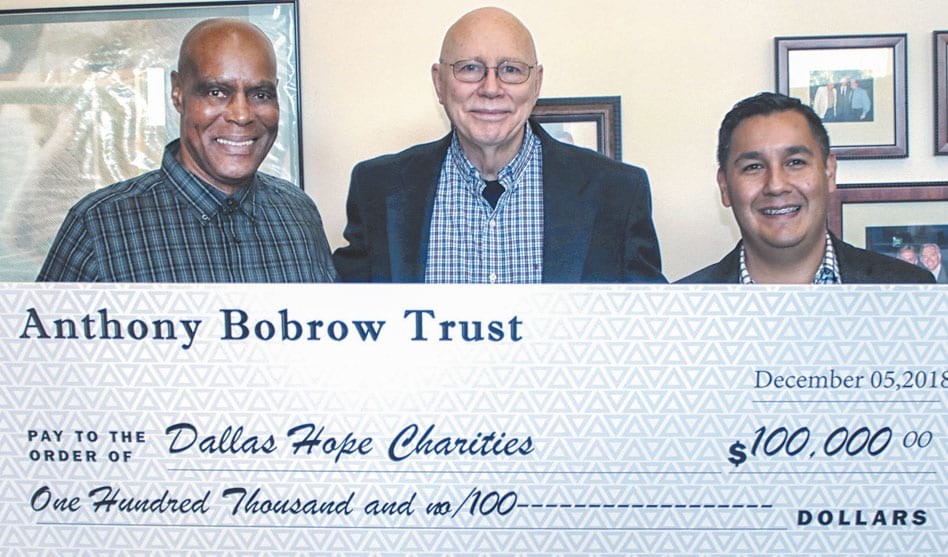Harvey Meissner, center, presents a check to Cline Taplin, left, and Jason Vallejo of Dallas Hope Charities. (Tammye Nash / Dallas Voice)
From Staff Reports
The Anthony Bobrow Trust this week donated $100,000 to Dallas Hope Center, a shelter for homeless LGBT youth ages 18-24 that is operated by Dallas Hope Charities. The donation makes the Bobrow Trust Dallas Hope Center’s anchor donor.
The Anthony Bobrow Trust was established following the death of Anthony “Tony” Bobrow, longtime philanthropist and owner of The Hidden Door, in February this year. On May 1, Harvey Meissner, president and general manager of The Hidden Door Inc., presented checks totaling $250,000 to three community organizations — Resource Center, Legacy Counseling Center and AIN — in the first outlay of funds from the Bobrow Trust.
In announcing the donation this week to Dallas Hope Center, Meissner, said, “Anthony Bobrow, for 35 years a leader of the GLBTQ community in Dallas, left his entire estate in trust to provide resources for projects like this. Through the decades, The Hidden Door, under Tony’s leadership, supported efforts vital to us. He left instructions [that] we’re to continue” that tradition.
“Most of the annual net revenues of The Hidden Door are being returned to non-profits serving GLBTQ people in Dallas,” Meissner continued. “In our first six months, the Anthony Bobrow Trust has contributed almost $400,000. We thank the customers of The Hidden Door for making that possible, and we look forward to continuing doing that in 2019.”
Meissner said officials of the trust chose to donate funds to Dallas Hope Center because “we’ve all heard the horror stories of young adults being kicked out of their homes and onto the streets.” He noted that an estimated 40 percent of homeless teens self-identify as GLBTQ. In fact, he said, the Metro Dallas Homeless Alliance counted, in one week, 179 young adults experiencing homelessness.
“And many of them tell the same story: They’ve been kicked out by parents who think their sexual orientation or gender identity is a sin,” Meissner said. “We join the center in asking all our community to come together and aggressively deal with the crisis.”
Dallas Hope Center has already opened transitional housing for homeless GLBTQ youth and is providing shelter and making medical and psychological care available, Messiner noted, “with guidance for a future that includes employment and education.”
The center has “an emergency need” to expand that to at least 10 beds, Meissner said. And Dallas Hope Charities Director Jason Vallejo and Development Director Cline Taplin both said this week there are even greater things to come.
Vallejo and Taplin said this week that Dallas Hope Charities currently has a one-bedroom apartment available, and a bank has offered the agency a larger house, assumed by the bank through foreclosure, to use once the agency has funds to cover the costs of operating a larger facility. They said they estimate it would cost about $250,000 a year to operate.
Dallas Hope Charities’ eventual plan, though, is to have a much larger, multi-unit facility, with one side dedicated to housing for LGBTQ youth, and the other to housing for LGBTQ seniors. █













